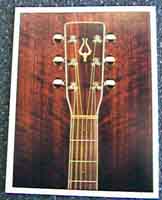 |
| Daion
"love at first Cmaj7" ad. |
| |
 |
| Daion's
catalog cover, 1982 |
back to
index
|
The complex
history of Yamaki guitars is entwined with the stories of a number of
other Japanese music companies.
In the late
1940s, brothers Yasuyuki and Kazuyuki Teradaira went to work for Tatsuno
Mokko, an instrument manufacturer that later split into two different
firms, one of which was called Hayashi Gakki.
In 1954
Hayashi Gakki was bought out by Zenon, a large music distributor.
In 1962
Yasuyuki left Zenon, and started an instrument distributorship he called
Daion, which means “big sound” or “enlightened” in Japanese.
In 1967
Kazuyuki left Zenon to produce classical guitars under the name Yamaki,
an auspicious Japanese word meaning “happy trees on the mountain.”
By the
early 1970s, Kazuyuki expanded the Yamaki line to include a large number
of steel-string guitars, many of which were clearly based upon C.F.
Martin and Co.’s designs and these were distributed exclusively through
Daion.
Along with
Yamaki guitars, Daion distributed instruments from Chaki, Hamox, Mitsura
Shinano, Terada, and Tamura (several of these were built by Yamaki at
various times), and Harptone guitars -- which Daion imported from the
US. Many guitars were built to specifications of small U.S.
distributors, and carried different labels -- including Joodee, G.J.
Gould & Sons, and others. These guitars usually bore the same model
numbers as their Yamaki counterparts.
Sometime in
the late 1960s, Daion began exporting Yamaki guitars to America, where
they were well received. By the late 1970’s, however, Daion felt that
the Yamaki Martin-style guitars were getting lost among similar
instruments from other Japanese builders like Takamine, Yasuma, and C.F.
Mountain, so they re-designed their entire acoustic line. They dropped
the Yamaki name and re-branded their instruments as Daion guitars.
In 1978,
Tom Burr and staff from MCI Inc. (who company was the North American
distributor for Daion guitars), joined forces with guitar designer
Hirotsugu Teradaira of Daion, and provided innovative ideas for much of
the new Daion line of instruments, particularly the acoustic-electrics
and solid-body electrics.
Daion began
an extensive advertising campaign to introduce the new line around 1980,
but this was a time when musicians were more interested in the new
MIDI-equipped synthesizers than in guitars. In 1984 Daion stopped
exporting guitars to America and went out of business shortly after MCI
Inc. filed for bankruptcy in the USA.
Yamaki, on
the other hand, survived the downturn of the 1980's and now makes parts
for other Japanese guitar companies.
Sources:
|